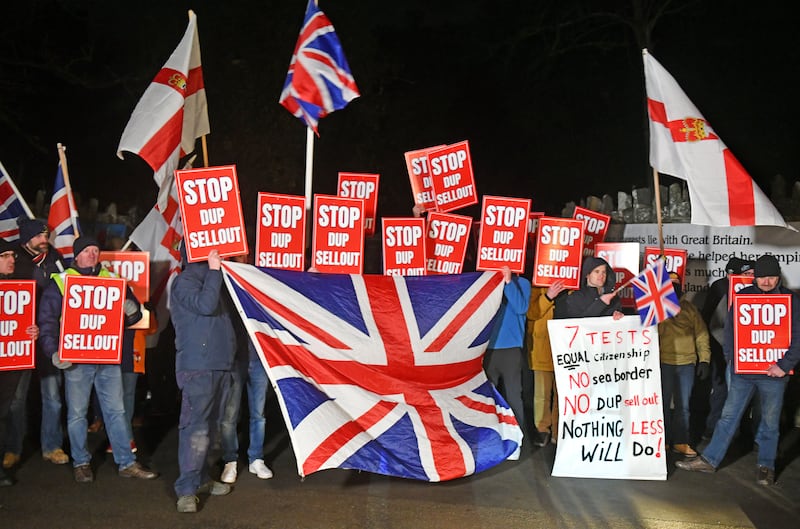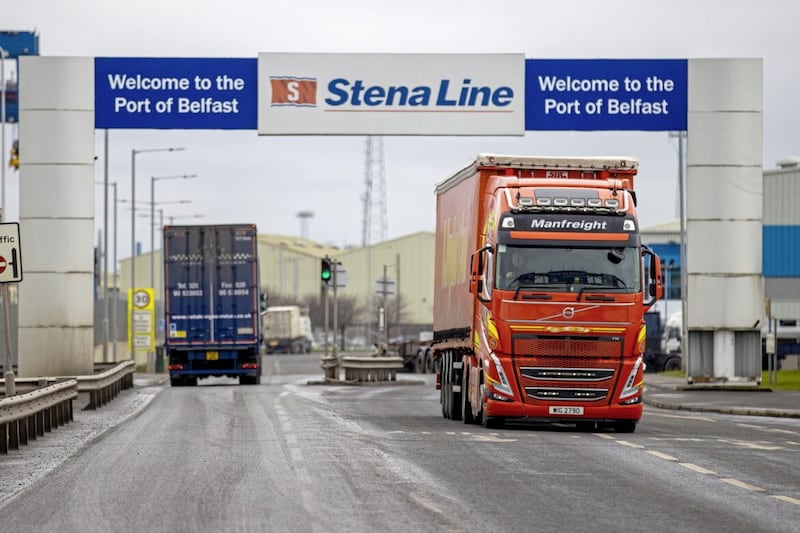James Breslin, an American political commentator, coined the phrase ‘smoke and mirrors’ in 1975 writing about Watergate. He described politics as the “theatrical use of mirrors and blue smoke to make people see what they wish to see”.
There is a lot swirling around today and there’ll be plenty more tomorrow.
Plenty more, because no-one has yet seen the details of the deal with the British government, so Jeffrey Donaldson has been able to spin it to his own maximum advantage. Tomorrow we’re promised the details will be published in what British governments curiously call a command paper. This will contain the legislative proposals and will allow Donaldson’s opponents to start picking his claims apart.
- The Irish News view: Was two years of letting public services get trashed really worth it, Sir Jeffrey?Opens in new window
- Politics Live: Jamie Bryson DUP mole ‘wearing a wire’ at crunch meetingOpens in new window
- Alex Kane: Jeffrey Donaldson and the DUP have to prove that the price for its backtracking will be worth itOpens in new window
Make no mistake, while the most vociferous opponents are in the TUV and among loyalists, there remains serious opposition within the DUP itself. For this reason the plan is to get the Stormont executive up and running on Saturday before any organised resistance has time to emerge.

Donaldson has admitted that he didn’t achieve all he wanted, but so far hasn’t said what he didn’t get. This morning he was pushing his luck with his claims about no new EU legislation applying here and the inability of the UK to diverge from EU standards.
There lies political danger for Rishi Sunak from the arch-Brexiteers in his own party. The Business and Trade Minister, Kemi Badenoch, has already indicated her opposition to blocks on divergence. As a result of Donaldson over-egging the pudding, NIO minister Steve Baker, the self-styled ‘hard man of Brexit’, was swiftly out of the blocks to proclaim: “For the record there are no commitments of any kind to align GB with EU law, prevent GB from diverging from any retained EU law or increase alignment in NI beyond the strictly limited scope parliament has approved…”.
- John Manley: Donaldson needs to hold his nerve as unionism faces a fractureOpens in new window
- Sinn Féin leader says Michelle O’Neill’s appointment as first minister is ‘moment of very great significance’Opens in new window
- Analysis: A restored executive will soon have many nettles to graspOpens in new window
Despite Donaldson’s claims, the protocol remains as streamlined by the Windsor Framework. An Irish Sea border remains because the Trade & Cooperation Agreement means there has to be a trade border somewhere and the Irish Sea is it.
Donaldson is also fudging the question of checks. There was never a problem with trade from the north to GB, despite DUP suggestions, because the EU doesn’t care what goes into GB. The EU does care what goes into the single market and that’s why there’s a red lane. Checks in the green lane were due to go down to 5% later this year. Spot checks will still remain.
The matter of divergence from EU standards remains fraught and complex. You’ll note in Baker’s statement above that he carefully refers to GB aligning or diverging, not the UK. That’s because the north stays in the single market and subject to EU law governing the single market and the arbiter of that law is the European Court of Justice.
However, as GB checks on imports begin on Thursday and intensify in April, British traders are pleading with the government not to diverge from EU standards because of the huge increases in costs both in exports and imports. It’s in Britain’s economic interest to diverge as little as possible.

It’s with Donaldson’s claims about ‘restoring’ the north’s constitutional position that the full panoply of smoke and mirrors is brought into play because there never was any change despite the nonsense about the Act of Union. The UK Supreme Court found there was no change in the north’s constitutional position, end of. However, the DUP knew better. Now they’re going to be given a meaningless bit of legislation saying the north is in the UK. Who knew?
So, speed is of the essence to get the deal over the line before there’s time for DUP dissidents to see through the smoke and mirrors. Once done, no-one will notice any difference in everyday life – as they haven’t hitherto, despite the DUP protesting otherwise – except for one aspect, and it’s a mighty consequential one for the DUP to come to terms with. Nothing to do with the Irish Sea border though.
Speed is of the essence to get the deal over the line before there’s time for DUP dissidents to see through the smoke and mirrors. Once done, no-one will notice any difference in everyday life. Except for one aspect, and it’s a ightly consequential one: There’ll be a Sinn Féin First Minister in the person of Michelle O’Neill
There’ll be a Sinn Féin First Minister in the person of Michelle O’Neill. That’s a paradigm shift for unionists, but particularly for the DUP, some of whom can hardly get the phrase ‘Sinn Féin First Minister’ out through their teeth.
For unionists it’s a bigger change than the Irish Sea border or Brexit, for that really does call into question the point of the north’s existence. If this place was to guarantee perpetual unionist hegemony, what’s it for now?


